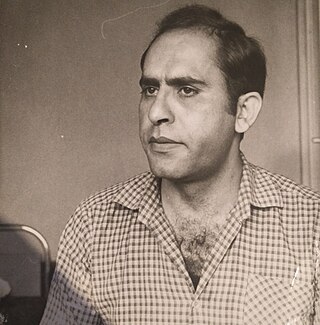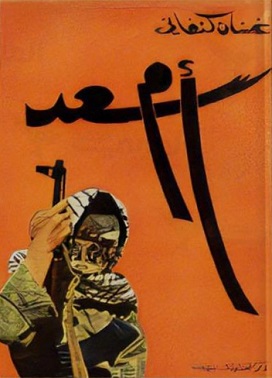Related Research Articles

Ghassan Kanafani was a Palestinian author and a leading member of the Popular Front for the Liberation of Palestine (PFLP). On 8 July 1972, he was assassinated by Mossad.
Patricio José Argüello Ryan, commonly referred to simply as Patrick Argüello, was a Nicaraguan-American Marxist–Leninist militant. He was a member of the Sandinista National Liberation Front (FSLN), and is best-known for his unsuccessful hijacking of El Al Flight 219 alongside Palestinian militant Leila Khaled on September 6, 1970. Flight 219 was an international civilian passenger flight from Tel Aviv to New York City that was hijacked by the duo shortly after it took off from a stopover in Amsterdam. Argüello and Khaled, acting on part of a larger series of hijackings by the Popular Front for the Liberation of Palestine (PFLP), ultimately failed to take control of the plane due to heavy resistance from the passengers and security, who subdued the duo after pilot Uri Bar-Lev had thrown them off balance by putting the plane into a steep nosedive. Bar-Lev then made an emergency landing at Heathrow Airport in London, where Argüello was shot multiple times, later succumbing to his injuries. The FSLN had agreed to support the PFLP's hijackings in exchange for guerrilla warfare training.
Men in the Sun is a novel by Palestinian writer and political activist Ghassan Kanafani (1936–72), originally published in 1962.Men in the Sun follows three Palestinian refugees seeking to travel from the refugee camps in Iraq, where they cannot find work, to Kuwait where they hope to find work as laborers in the oil boom.

Palestinian literature refers to the Arabic language novels, short stories and poems produced by Palestinians. Forming part of the broader genre of Arabic literature, contemporary Palestinian literature is often characterized by its heightened sense of irony and the exploration of existential themes and issues of identity. References to the subjects of resistance to occupation, exile, loss, and love and longing for homeland are also common.
The Dupes is a 1973 Syrian drama film directed by Tewfik Saleh and starring Mohamed Kheir-Halouani, Abderrahman Alrahy, Bassan Lotfi, Saleh Kholoki and Thanaa Debsi. Based on Ghassan Kanafani's 1963 novel, Men in the Sun, the film portrays the lives of three Palestinian refugees after the 1948 Palestinian expulsion and flight by following three generations of men who made their way from Palestine to Iraq in the hope of reaching Kuwait to pursue their dreams of freedom and prosperity. The Dupes received very positive reviews from critics and won multiple awards locally and internationally. It was entered into the 8th Moscow International Film Festival, where it was nominated for the Golden Prize, and the 1972 Carthage Film Festival, where it won the Tanit d'Or.
The Survivor is a 1996 Iranian epic historical drama film about Arab–Israeli conflict starring Salma Al-Masri, Alaa El Din Koksh, Ghassan Massoud, and Jamal Suleiman. The script is based on Returning to Haifa, a novel by the Palestinian author Ghassan Kanafani in 1969. The novel is about Israeli Declaration of Independence and its government in Haifa in 1948.
Amjad Nasser, known with the pseudonym of Yahya Numeiri al-Naimat, was a London-based Jordanian writer, journalist and poet and one of the pioneers of modern Arabic poetry and Arabic prose poem.

Huzama Habayeb ) is a Palestinian novelist, storyteller, columnist, translator, and poet who has won multiple awards such as Mahmoud Seif Eddin ِAl-Erani Award for Short Stories, Jerusalem Festival of Youth Innovation in Short Stories, and Naguib Mahfouz Medal for Literature. Upon graduating from Kuwait University in 1987 with a BA. degree in English language and Literature, she pursued careers in journalism, teaching, and translation before she eventually started to write professionally as a published author. She is a member of both the Jordanian Writers Association and the Arab Writers Federation.
Mohsine Loukili, a Moroccan novelist, born in 1978. He published more than 5 books and won several awards including Ghassan Kanfani Award for Narration in 2016.

Izz Al-Din Manasirah was a Palestinian poet, critic, intellectual and academic born in the town of Bani Naim, Hebron Governorate, Palestine. Winner of several prizes as a cadet and an academic, he was a poet of the Palestinian resistance from the late 1960s on, and his name was associated with armed and cultural resistance. He was with such poets as Mahmoud Darwish, Samih al-Qasim and Tawfiq Ziad, or as they are collectively called, the "Big Four in Palestinian Poetry." He sang poems by Marcel Khalife and others and was famous for his poems "Jafra" and "The Green Kannah."
Suheil Kiwan is a Palestinian journalist and novelist. He won the Tawfiq Zayyad Institution Award in 2002 for his critical study titled ‘Ghassan Kanafani: Al-Jamal Al-Hazeen wa Al-‘Ata’ Al-Mutawahij'.
Nejmeh Khalil Habib is a Palestinian writer. She obtained a doctorate in philosophy from the University of Sydney in Australia. She was awarded a scholarship from the Australia Council for the Arts, as well as The Gibran Khalil Gibran International Prize issued by the Association for the Revival of Arab Heritage in Australia. In addition, she received a certificate of appreciation from the General Federation of Palestine Workers, Australia Branch.
The Sad Orange Land is a collection of stories by the Palestinian writer Ghassan Kanafani, it is the second stories collection. originally published in 1962, in which he attempted to convey the Palestinian character in the face of its fate both within the Palestinian interior, such as stories:
A Death in Bed No.12 is the first collection of stories written by Ghassan Kanafani. It was published in Beirut in 1961 with a short introduction by Ghassan that said: "I believe that the book should introduce itself, and if it fails to fulfill part of its writers' ambition, then the writer must simply accept it, as before- times and times- before the writers rips the stories to write them again, and like that, I push "A Death in Bed No.12" to find its own way, if it could find the beginning of the way". This collection of stories mainly explore the feeling of exile, which is portrayed through unilateral attachment to the past. The title comes from a story in the second part of the book. The revolves around a patient writing a letter to his friend Ahmed telling him about a death incident in bed 12, and about how each one of us hears about and perceives death differently. Ghassan Kanafani send in the introduction to an anonymous family whom their eldest son "Mohammed Ali Akbar" died away and alone in bed number 12.
Return to Haifa is a novella written by Palestinian author and journalist, Ghassan Kanafani, which mainly depicts Israel occupation over the Palestinian lands during the 1948 war in Haifa when Britain was in control of the land.
The Hat and the Prophet is a play written by Palestinian fiction writer and journalist, Ghassan Kanafani. Although Kanafani completed the play in 1967, it was only published in 1973; nine months after Kanafani's assassination.

Umm Saad is a novella written by fiction writer and journalist Ghassan Kanafani. The book surrounds the themes of war, patience, and resistance through a first point of view perspective. Upon its release, its political and social themes were generally praised.
A World Not Our Own is a short story collection by the Palestinian writer Ghassan Kanafani. All the stories in this collection were written between 1959 and 1963, lest for the last story, which was written in 1965. The anthology was published for the first time in 1965 in Beirut. The collection portrays the life of the average Palestinian citizen under the occupation, centering on the never-ending fear and anxiety. Kanafani focuses on the usage of figurative language to address the Palestinian Cause and its effects on Palestinians in Palestine and in the diaspora. The collection takes inspiration from Kanafani's biography, and his struggle with alienation. It also deals with his insistence on his intellectual and physical resistance. Kanafani's preference to use figurative language has political and literary purposes, which he elaborates on in his study Resistance Literature in Occupied Palestine: 1948–1966.
The Stolen Shirt is one of the first published stories by the Palestinian author, Ghassan Kanafani. It was published as part of his first short story collection, Death Bed No. 12 in 1958. The story won first place in a literary competition in Kuwait. In it, Kanafani looks at Palestinian suffering under the occupation through his employment of symbols.
The Other Thing: Who Killed Leila Hayek is a novel by the Palestinian writer Ghassan Kanafani. It was published in 1987 by the Arabic Research Foundation. The novel was first published serially in nine parts, starting from 1966, in Al-Hawadith weekly magazine, which was issued in Beirut.
References
- 1 2 Kanafani, Ghassan (1987). The Lover (in Arabic). Arab Research Foundation.
- ↑ "The Lover". A5dr.com.
- 1 2 "The novel "The Lover" .. the stories that were completed by their incompleteness". Enab Baladi.